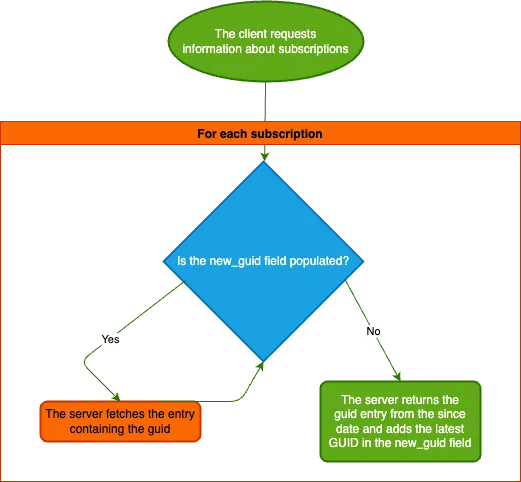Get all subscriptions
GET /v1/subscriptionsThis endpoint enables clients to return all subscription information relating to the authenticated user. It returns pagination information and an array of subscriptions.
Response fields
Metadata
| Field | Type | Required? | Description |
|---|---|---|---|
total | Number | Yes | The total number of objects returned by the call |
page | Number | Yes | The number of the page returned in the call |
per_page | Number | Yes | The number of results returned per page |
next | String | No | The URL for the next page of results |
previous | String | No | The URL for the previous page of results |
Subscription fields
| Field | Type | Required? | Description |
|---|---|---|---|
feed_url | String | Yes | The URL of the podcast RSS feed |
guid | String<UUID> | Yes | The globally unique ID of the podcast |
is_subscribed | Boolean | Yes | Whether the user is subscribed to the podcast |
subscription_changed | Datetime | No | The date on which details relating to the subscription last changed. Presented in ISO 8601 format |
guid_changed | Datetime | No | The date on which the podcast’s guid or new_guid was last updated. Presented in ISO 8601 format |
new_guid | String<UUID> | No | The new GUID associated with the podcast |
deleted | Datetime | No | The date on which the subscription was deleted. Only returned if the field is not NULL |
Parameters
The client MAY add the following parameters to their call:
| Field | Type | In | Required? | Description |
|---|---|---|---|---|
since | DateTime | Query | No | The date from which the server should return objects. The server only returns entries whose subscription_changed, guid_changed, or deleted fields are greater than this parameter. Expected in ISO 8601 format |
page | Number | Query | No | The page of results to be returned by the server. Defaults to 1 if not present |
per_page | Number | Query | No | The number of results to return in each call. Defaults to 50 if not present |
Server-side behavior
If the entry contains a new_guid, the server MUST return the newest guid associated with the entry in the response’s new_guid field. For example: if a subscription has received 2 new guids, the server MUST return:
- The subscription’s
guidas it was at the date passed in thesinceparameter, or the original entry’sguidif nosinceparameter is passed - The subscription’s latest
guidin thenew_guidfield
This ensures the client has the most up-to-date entry for the subscription.

Client behavior
The client SHOULD update its local subscription data to match the information returned in the response. On receipt of a deleted subscription, the client SHOULD present the user with the option to remove their local data or send their local data to the server to reinstate the subscription details.
Resolution example
This example demonstrates how the server resolves a new_guid field for a subscription that has received three GUIDs. Here is how the data is represented in the database:
feed_url | guid | is_subscribed | subscription_changed | guid_change | new_guid |
|---|---|---|---|---|---|
https://example.com/rss1 | 64c1593b-5a1e-4e89-b8a3-d91501065e80 | true | 2022-03-21T18:45:35.513Z | 2022-03-21T19:00:00.000Z | daac3ce5-7b16-4cf0-8294-86ad71944a64 |
https://example.com/rss1 | daac3ce5-7b16-4cf0-8294-86ad71944a64 | true | 2022-03-21T18:45:35.513Z | 2022-12-23T10:24:14.670Z | 36a47c4c-4aa3-428a-8132-3712a8422002 |
https://example.com/rss1 | 36a47c4c-4aa3-428a-8132-3712a8422002 | true | 2022-03-21T18:45:35.513Z | 2022-12-23T10:24:14.670Z |
Scenario 1
In this scenario, the client requests all subscriptions and doesn’t pass a since parameter. This means the server passes the original GUID in the guid field, and the latest GUID in the new_guidfield.
$ curl -X 'GET' \'/v1/subscriptions?page=1&per_page=5' \-H 'accept: application/json'$ curl -X 'GET' \'/v1/subscriptions?page=1&per_page=5' \-H 'accept: application/xml'{"total": 1,"page": 1,"per_page": 5,"subscriptions": [ { "feed_url": "https://example.com/rss1", "guid": "64c1593b-5a1e-4e89-b8a3-d91501065e80", "is_subscribed": true, "guid_changed": "2022-12-23T10:24:14.670Z", "new_guid": "36a47c4c-4aa3-428a-8132-3712a8422002" }]}<?xml version="1.0" encoding="UTF-8"?><subscriptions> <total>1</total> <page>1</page> <per_page>5</per_page> <subscription> <feed_url>https://example.com/rss1</feed_url> <guid>64c1593b-5a1e-4e89-b8a3-d91501065e80</guid> <is_subscribed>true</is_subscribed> <guid_changed>2022-12-23T10:24:14.670Z</guid_changed> <new_guid>36a47c4c-4aa3-428a-8132-3712a8422002</new_guid> </subscription></subscriptions>Scenario 2
In this scenario, the client requests all subscriptions and specifies a since date of 2022-05-30T00:00:00.000Z. Since the first GUID change occurred before this date, and the second GUID change occurred after this date, the server responds with the second GUID in the guid field, and the latest GUID in the new_guid field.
$ curl -X 'GET' \'/v1/subscriptions?since=2022-05-30T00%3A00%3A00.000Z&page=1&per_page=5' \-H 'accept: application/json'$ curl -X 'GET' \'/v1/subscriptions?since=2022-05-30T00%3A00%3A00.000Z&page=1&per_page=5' \-H 'accept: application/xml'{ "total": 1, "page": 1, "per_page": 5, "subscriptions": [ { "feed_url": "https://example.com/rss1", "guid": "daac3ce5-7b16-4cf0-8294-86ad71944a64", "is_subscribed": true, "guid_changed": "2022-12-23T10:24:14.670Z", "new_guid": "36a47c4c-4aa3-428a-8132-3712a8422002" } ]}<?xml version="1.0" encoding="UTF-8"?><subscriptions> <total>1</total> <page>1</page> <per_page>5</per_page> <subscription> <feed_url>https://example.com/rss1</feed_url> <guid>daac3ce5-7b16-4cf0-8294-86ad71944a64</guid> <is_subscribed>true</is_subscribed> <guid_changed>2022-12-23T10:24:14.670Z</guid_changed> <new_guid>36a47c4c-4aa3-428a-8132-3712a8422002</new_guid> </subscription></subscriptions>Example request
$ curl -X 'GET' \'/v1/subscriptions?since=2022-04-23T18%3A25%3A34.511Z&page=1&per_page=5' \-H 'accept: application/json'$ curl -X 'GET' \'/v1/subscriptions?since=2022-04-23T18%3A25%3A34.511Z&page=1&per_page=5' \-H 'accept: application/xml'Example 200 response
{ "total": 2, "page": 1, "per_page": 5, "subscriptions": [ { "feed_url": "https://example.com/rss1", "guid": "31740ac6-e39d-49cd-9179-634bcecf4143", "is_subscribed": true, "guid_changed": "2022-09-21T10:25:32.411Z", "new_guid": "8d1f8f09-4f50-4327-9a63-639bfb1cbd98" }, { "feed_url": "https://example.com/rss2", "guid": "968cb508-803c-493c-8ff2-9e397dadb83c", "is_subscribed": false, "subscription_changed": "2022-04-24T17:53:21.573Z" } ]}<?xml version="1.0" encoding="UTF-8"?><subscriptions> <total>2</total> <page>1</page> <per_page>5</per_page> <subscription> <feed_url>https://example.com/rss1</feed_url> <guid>31740ac6-e39d-49cd-9179-634bcecf4143</guid> <is_subscribed>true</is_subscribed> <guid_changed>2022-09-21T10:25:32.411Z</guid_changed> <new_guid>8d1f8f09-4f50-4327-9a63-639bfb1cbd98</new_guid> </subscription> <subscription> <feed_url>https://example.com/rss2</feed_url> <guid>968cb508-803c-493c-8ff2-9e397dadb83c</guid> <is_subscribed>false</is_subscribed> <subscription_changed>2022-04-24T17:53:21.573Z</subscription_changed> </subscription></subscriptions>